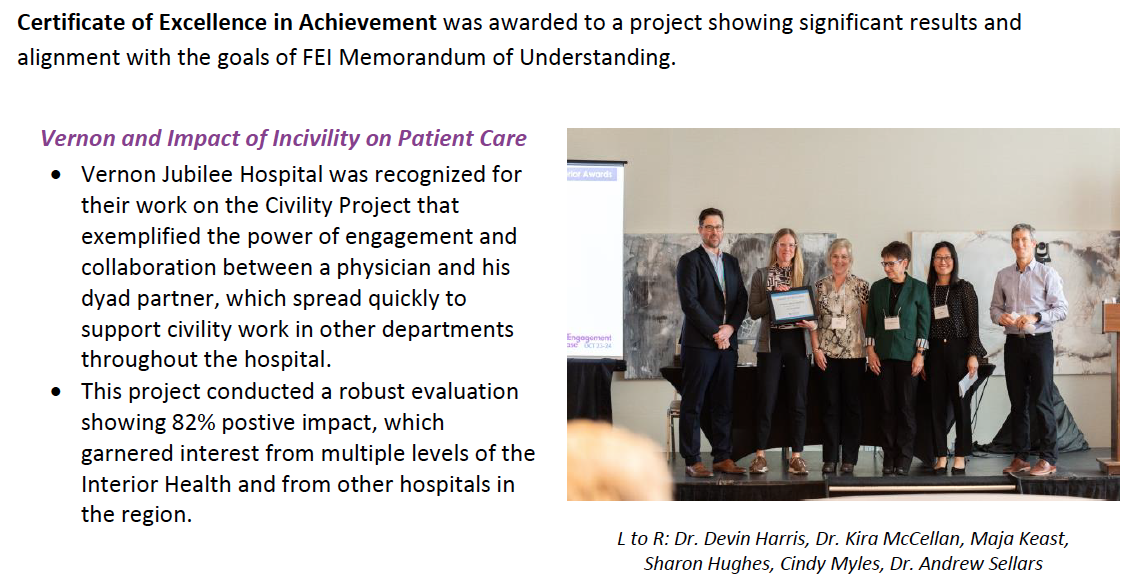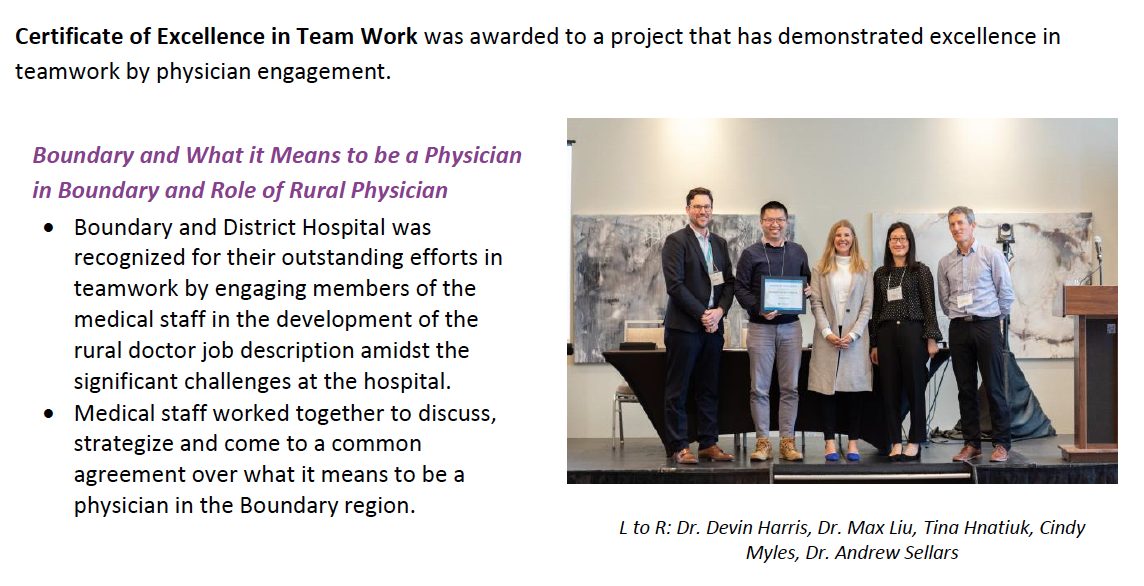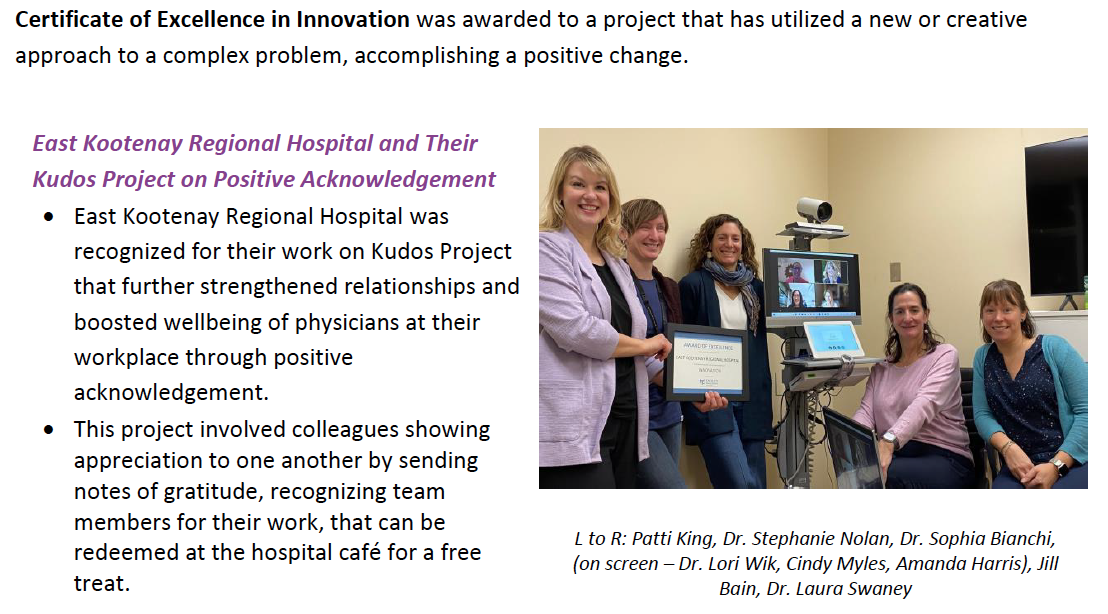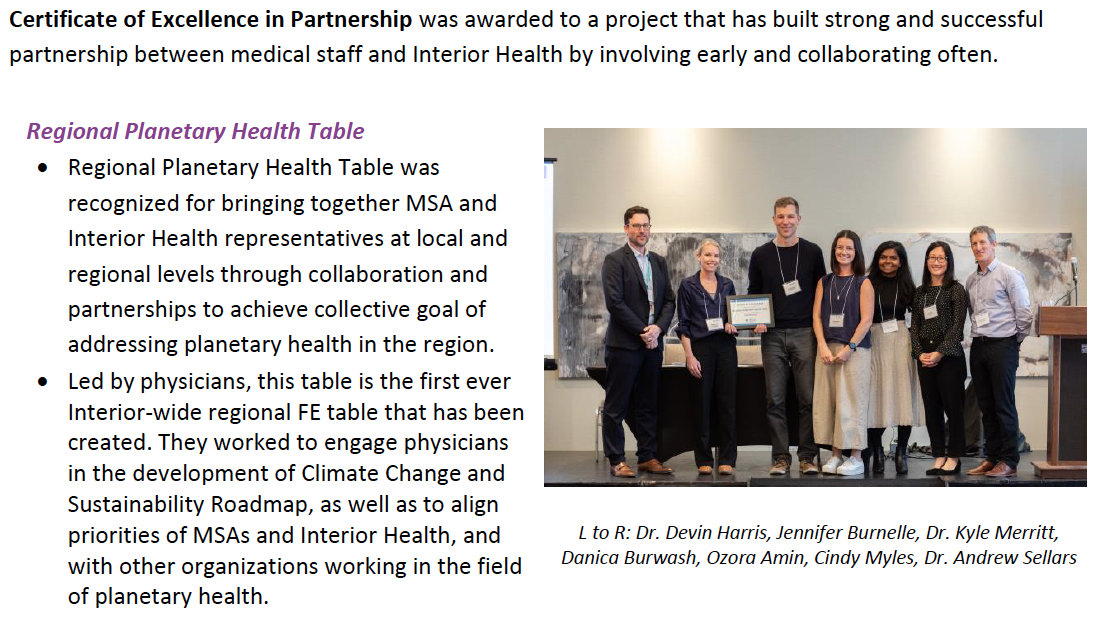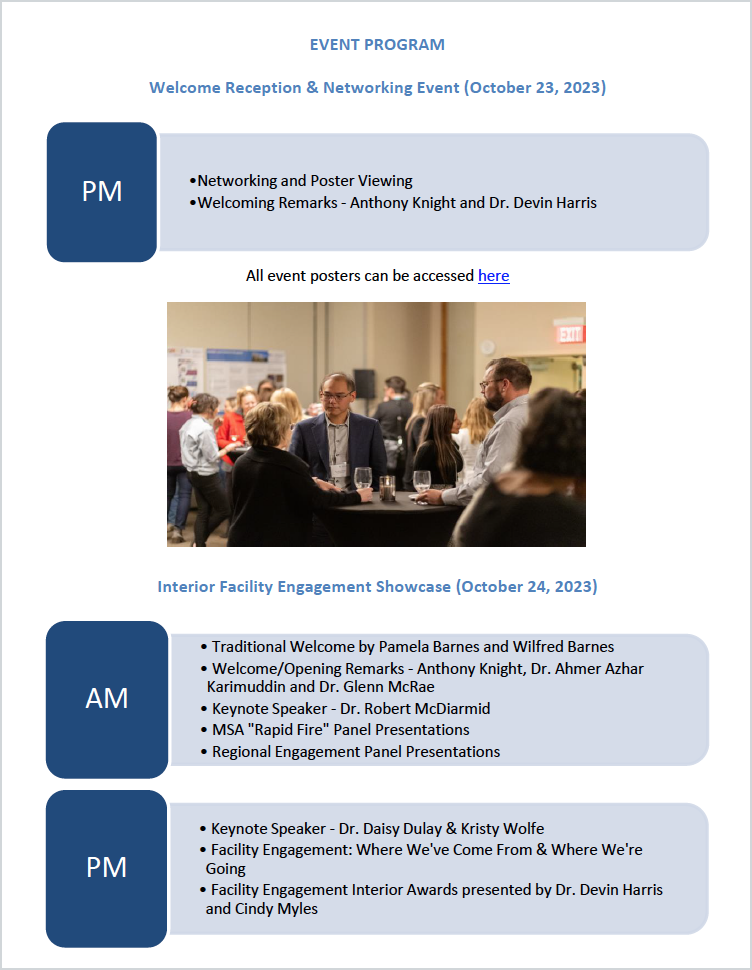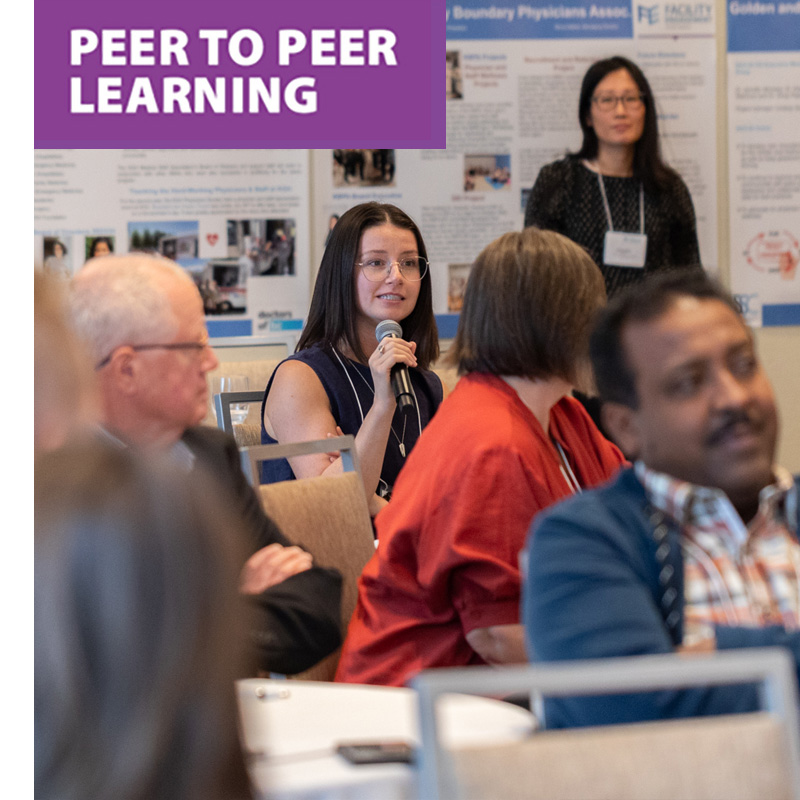
The Interior Health Showcase brought together 14 MSA physician representatives, 15 project administrators, and 24 Interior Health (IH) leaders to share, learn, and connect, and to consider next steps to move Facility Engagement forward.
The 2023 Showcase held in Kelowna featured keynote speakers, rapid fire presentations, panel and group discussions, project poster displays, and an awards presentation for MSAs exemplifying excellence in the areas of Innovation, Achievement, Partnership, and Teamwork.
SESSION HIGHLIGHTS
Key Takeaways
KEY TAKEWAYS
What is working well?
- Breaking down communication barriers
- Reducing silos
- Face-to-face connections
- Being recognized for non-clinical work
- Autonomy to self-govern
Opportunities and innovations to explore:
- Sustainability and planetary health
- Co-funding and involvement of allied health professionals
- Closing feedback loops on provincial data collections
- Flexibility to act locally, and local manager support
- Reducing the impact of turnover by increasing education and awareness of Facility Engagement among site administration and leaders
- Creating a new shared space for physicians and administrators to meet in the middle
- Sub-regional tables with similar sized sites
- Leveraging Facility Engagement to support engagement at different levels of administration
Keynote Presentations
Co-Creating the Future: Common Ground, Conscious Choice and Compassionate Leadership - Dr. Robert McDermid
• Reciprocity is important in generating a common understanding and shared values between team members.
• Attention creates a story and transgenerational thinking helps develop a cohesive narrative.
• Trust needs to be earned by leaders by being competent, reliable, honest, compassionate and open.
From Shame to Strength: Transforming Inhibition into Empowerment - Dr. Daisy Dulay & Kristy Wolfe
• Narrative medicine, like digital stories, allows for self-reflection, opportunities for empathy and self-compassion.
• Sharing your story with patients fosters conversation and an opportunity to learn from each other.
• Paying your story forward so that others can contribute to reducing stigma and encouraging others to speak out.
Rapid Fire Presentations
FEI First Nations Cultural Sensitivity Enhancement - 100 Mile House District General Hospital
• Four physicians participated in a in-community experiential learning day, hosted in a local First Nations community, experiencing a smudging ceremony, cultural teachings, some touring on traditional territory, and a traditional meal with community members and elders to better understand the First Nations culture of many of their patients.
• Working together to build an ongoing relationship to improve knowledge and develop trust and respect, and to improve health care outcomes for local First Nations population.
Check out the Doctors of BC Guide for Respectful Indigenous Engagement to support divisions, MSAs, and physician members in their work with First Nations, Métis, and Inuit.
Encouraging Engagement Project - Invermere & District Hospital
• Improving physician engagement in the MSA through personal growth and better understanding of their passions, goals and interests using behavioural assessment tools.
• Lessons learned included the impact variations in personality types, enablers and goals of physicians can have on engagement, and the challenges of engaging with the disengaged.
Physician Waffle House - Vernon Jubilee Hospital
• Working collaboratively with other MSAs in the region, Interior Health, the local Division of Family Practice, and the local government to create an online gathering place for physicians to work, connect, learn and play.
Improving Surgical Optimization and Pre-Surgical Education for Orthopedic Patients - Kelowna General Hospital
• Focusing on pre-habilitation, pre-operative education, and pre-operative optimization by creating educational materials on an online platform for patients.
• Empowering patient centred care and education, as well as improving time to discharge and post-operative recovery.
Making the ER "Kid" Friendly - Golden & District Hospital
• Physicians, Interior Health administrators and nurses working collaboratively to create a safe and welcoming environment for children in the emergency department. This project has improved patient experience and boosted staff morale.
• Lessons learned included the need to adhere to Interior Health guidelines and standards for any changes to the hospital.
Trauma-Informed Hospital Care - Kootenay Lake Hospital
• Improving awareness amongst hospital staff on trauma informed care best practices by creating a five-part Trauma Informed Care Series and Trauma Informed Care Quick Refrence Guide.
• Lessons learned included the project would have been more impactful with the participation of patients who have experienced trauma, and the challenges of finding champions to support implementing this work within the hospital.
Electroconvulsive Therapy (ECT) as a Treatment Modality - Royal Inland Hospital & Hillside Centre
• Working to attract more psychiatrists and to provide expert information and education to psychiatrists to improve patient outcomes, safer clinical decision making and increase knowledge for physicians.
• Lessons learned were that ECT is an essential treatment modality available to psychiatrists, and that utilization of this modality improved engagement among psychiatrists.
Recruit, Retain, Retire - Creston Valley Hospital & Health Centre
• Successfully recruited four physicians, adjusted on-call scheduling for emergency department and have retired physicians working on a part-time/locum basis by taking a proactive recruitment approach and working with Interior Health.
• Lessons learned included sustained change in middle management personnel affected positive relationship building with the health authority and that change needs to be agreed to by all, including physicians.
Role of the Rural Physician in the Boundary - Boundary & District Hospital
• Creating clear roles and responsibilities for rural physicians, building a framework for how physicians can make decisions together and developing a mission statement for recruitment.
• Lessons learned included improved relationship and commonality amongst physicians and the ability to create consensus amongst physicians as to their commitments to one another.
Panel presentations
IH Physician Quality Improvement Program
Jim Graham, Manager, PQI/SQI/Alumni, Dr. Michelle Scheepers
• Facility Engagement provides sessional funding support for physicians participating in three pillars of QI in Interior Health: Physician Quality Improvement (PQI), Spreading Quality Improvement (SQI) and Alumni.
• Physicians can access funding, technical support and education, as well as physician advisor/mentors and dyad partnerships through PQI.
Medical Staff Safety & Wellness
Rob Mitchell, Leader, Medical Staff Safety & Wellness, Interior HEalth
• Funding agreement was put in place in 2019 and 2022 Physician Master Agreement to address physical and psychological safety of physicians in their workplace.
• A governance structure has been set up to ensure all members from senior leadership to regional tables are part of the process, and initial work has been completed in defining physical and psychological safety, being practice ready and bringing together strategic partners for alignment.
East Kootenay Patient Transportation Committee
Dr. Todd Loewen, East Kootenay Senior Medical Director,Patti King, East Kootenay Engagement Partner
• Physical boundaries in the region presents unique patient transportation challenges in accessing tertiary medical centres in Cranbrook.
• The EK Patient Transportation Committee, which was formed in 2018, reconnected in 2021 and reaffirmed the desire to continue the regional work and focus on re-establishing relationships after it was stalled during the pandemic in 2020.
• The Committee organized educational opportunities for rural sites, such as Agitation in the Emergency Department sessions. To
Kootenay Boundary FE Regional Gender Equity Table
Dr. Shelina Musaji, Kootenay Boundary FE Regional Gender Equity Table
• A CMA Joule Course on women in medical leadership was funded in partnership by Specialist Services Committee (SSC), Physician Leadership Scholarship Program (PLSP) and Facility Engagement Initiative (FEI).
• This course provided an educational forum for women physicians to explore topics related to medical leadership, including needs and factors affecting career progression, as well as barriers and how women physicians can recognize and strengthen leadership strengths.
• Twenty-nine women physicians from the Kootenay Boundary region attended the course, with 94% of participants reporting that the skills they learned in the course enhanced their leadership and success in the healthcare field and 89% reporting that they were more inclined to take on a leadership role by the end of the course. For key highlights and feedback, click here.
Interior Regional Planetary Health Table
Dr. Kyle Merritt, Kootenay Lake Hospital MSA
Dr. Sue Pollack, IH Medical Health Officer
• Human health and the health of our planet are inextricably linked.
• Interior-wide table, in partnership with FE and IH, convened in 2021 bringing MSA representatives and Interior Health partners together to work on planetary health issues in Kootenay Boundary region.
• IH has come on board as a dyad partner with the Climate Change and Sustainability Roadmap for 2023-2028.
• For IH Climate Change & Sustainability Roadmap 2023-2028, click here.
Important next steps
- Clarify the intent of Facility Engagement (e.g., MSA vs physician – not synonymous)
- Revisit governance models to align with MSA values and culture
- Bring together MSAs in sub regions to determine common priorities
- Strengthen feedback loop by communicating action items that comes out of Doctors of BC Health Authority Engagement Survey
- Increase FE funding to offset inflated costs
- Work to address “pseudo-engagement” where there is engagement but no project follow through
- Involve senior administration leaders in creating projects with physicians

